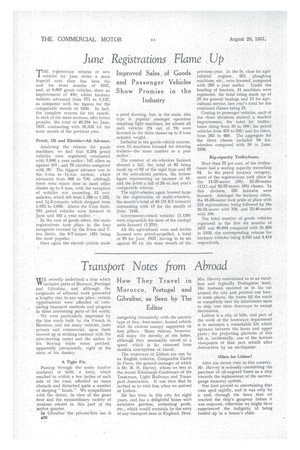Transport Notes from Abroad
Page 40

If you've noticed an error in this article please click here to report it so we can fix it.
How They Travel in Morocco, Portugal and Gibraltar, as Seen by The Editor
WE recently undertook a tour which included parts of Morocco, Portugal and Gibraltar, and although the exigencies of editorial work prevented a lengthy stay in any one place, certain 'opportunities were afforded of cornparing transport methods and progress in these interesting parts of the world.
We were particularly impressed by the fine roads built by the French in. Morocco, and the many vehicles, ...both private and commercial, upon them showed up in striking contrast with the slow-moving camel and the native in his flowing white robes Perched, apparently precariously, right at the stern of his donkey.
A Tight Fit.
• Passing through the souks (native markets) of Salle, a lorry, which reached to within a few inches of each side of the road, afforded no mean obstacle and disturbed quite a number of sleeping "locals." We sympathized with the driver, in view of the great heat and the extraordinary variety of .noxious odours in this part of the native quarter.
In Gibraltar the private-hire car is B30
competing extensively with the ancient type of tiny, four-seater, horsed vehicle with its curious canopy supported on four pillars. Many visitors, however, still enjoy the novelty of the latter, although they necessarily travel at a speed which is far removed from modern conceptions of travel.
The tramways of Lisbon are run by an English concern, Companhia Canis de Ferro, the general manager of which is Mr. R. H. Harvey, whom we met at the recent Edinburgh Conference of the Tramways, Light Railways and Transport Association. It was then that he invited us to visit him when we arrived at Lisbon.
He has been in this city for eight years, and has a delightful house with extensive gardens, swimming pools, etc., which would certainly be the envy of any transport man in England. Here, Mrs. Harvey entertained us to an excellent and typically Portuguese meal. Her husband escorted us in his car around the city and pointed out how, in some places, the trams fill the roads so completely that the inhabitants have to skip into their doorways to escape decimation.
Lisbon is a city of hills, and part of the work of the tramways department is to maintain a remarkable lift which operates between the lower and upper parts; the projecting platform of this lift is, incidentally, one of the famous viewpoints of that part rebuilt after destruction by an earthquake.
Oilers for Lisbon?
After his recent visit to this country, Mr. Harvey is seriously considering the purchase of oil-engined buses as a step towards the replacement of the narrowgauge tramway system.
Our host proved so entertaining that time sped rapidly, and it was only by a rush through the town that we reached the ship's gangway before it was removed, otherwise we might have experienced the indignity, of being hauled up in a bosun's chair.




















































































